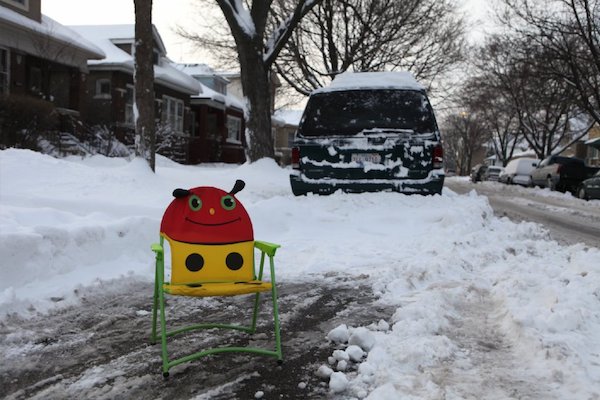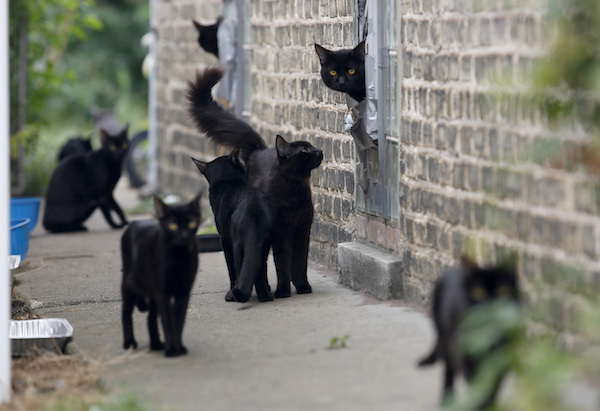“Chicagoese,” wrote the late newspaper columnist Mike Royko, is "one of the world’s most beautiful languages.” And, I would add, it has one of the most colorful vocabularies.
In 2010, Chicago published a list of words this city had introduced to the world, including Ferris wheel, egghead, yuppie, and jazz. But there are also terms and phrases we've kept for ourselves — sayings you'll hear only in Chicago. A few years ago, I compiled many of these into How to Speak Midwestern, a regional dictionary of sorts that I researched in various taverns around the city. A few examples are listed below. So settle down and read this in the frunchroom of your three-flat. But don’t read it on your phone while you’re driving down the Edens: you might cause an accident, and rubbernecking drivers would cause gapers' block as they slowed down to look at your wrecked car.
"16-inch"
Uniquely Chicago brand of slow-pitch softball that caught on during the Great Depression for two very practical reasons: a bigger, softer ball didn’t travel as far as the standard 12-incher, so it couldn’t be hit out of tiny urban parks. And, it could be caught barehanded, by fielders who couldn’t afford gloves. Each summer, Chicago emergency rooms see a spike in walk-in patients with jammed or broken fingers, most of them still wearing their softball jerseys.
"Bungalow Belt"
The brick bungalow is the prototypical working-class Chicago dwelling, especially common in areas far from the lake that were developed during the city’s rapid expansion in the first two decades of the 20th century. "Bungalow Belt" is a politico-sociological term for the socially conservative, racially segregated white neighborhoods of the Northwest and Southwest sides, which in the 1980s united in opposition to Harold Washington, the city’s first black mayor.
"Clout"
Political influence used to evade rules that must be followed by the less well-connected. Possessors can obtain no-bid contracts, police department promotions, admissions to selective high schools, and other favors. Both a noun and a verb. A political sponsor is a clout (formerly known by the politically incorrect term “Chinaman”). Royko provided proper uses of the term in a 1973 column: "Hey, Charlie, I see you made foreman. Who’s clouting for you?" Or, "Ever since my clout died, they’ve been making me work a full eight hours. I’ve never worked an eight-hour week before."
Dese, Dem, and Dose
Stereotypical pronunciations of "these, them, and those," associated with white ethnic Chicagoans. Speakers are sometimes called "dese, dem, and dose guys." Probably originates from the fact that most immigrants from Europe spoke languages without "th," and passed on this difficulty with the sound to their children. Satirized by Saturday Night Live’s Superfans, whose favorite team was "Da Bears." Mainly heard in speakers over 50, as younger people are consciously rejecting such distinctive markers of geography and class.
"Dibs"
In Chicago, competition for street parking is fierce, especially in the winter. If you shovel out a space on your block, you call “dibs” by blocking it with lawn chairs, crates, sawhorses, or other cast-off possessions. Became an accepted practice after the 1967 blizzard, which hit the city with 23 inches of snow. Drivers who violate dibs are likely to find key tracks on their paint jobs – or worse.

"Drill"
A dark, hardcore iteration of hip-hop that developed in Englewood. Prominent drill artists include Chief Keef, Lil Durk, Lil Reese, and King Louie. Lyrics are frequently about street life, and include disses of rival gang members that have led to retaliatory shootings. Coined by Pac Man, a rapper who was shot to death in 2010.
"Four Plus One"
Cheaply constructed, architecturally unloved five-story apartment houses in which the first floor is a combination lobby/parking lot. Proliferated in Lake View and Lincoln Park in the 1960s, taking advantage of a zoning loophole that allowed a parking lot to be categorized as a basement. Technically, that made the buildings four-stories high, allowing developers to save money by building with masonry exteriors and wood-frame interiors.
"Frunchroom"
The front room of a bungalow or flat, overlooking the street. The family’s best furniture is in the front room, but it’s only used to entertain company or open Christmas presents.
"Gangway"
A sidewalk running through a narrow space between two houses. Cop: “You see where that kid went?” Witness: “Yeah. He ran t’rough da gangway.”

A gangway full of cats Photo: Michael Tercha/Chicago Tribune
"Gapers' Block"
A traffic jam, due to motorists rubbernecking at an accident. Also known as “gapers' delay.”
"Gym shoes"
Sneakers or athletic shoes. “What kind of gym shoes did your maa buy you this year?” “P.F. Flyers!”
"The Hawk"
A cold wind off Lake Michigan. The term originated in Chicago’s African-American community, and was brought to the world’s attention by smooth R&B balladeer Lou Rawls, who mentioned it in the spoken-word intro to “Dead End Street”: “The Hawk, the almighty Hawk, the wind … in Chicago, the Hawk not only socks it to you, he socks it through you, like a giant razor blade blowing down the street.”
"Hunnert"
Every Chicago block encompasses 100 street numbers, measured from the city’s zero point, at State and Madison streets. Thus, Belmont Avenue, which is 32 blocks from Madison, is “thirty-two hunnert north.” Irving Park Road is forty blocks from Madison. Many Chicago would say it’s not “four thousand north” but “forty hunnert north,” because one block equals a hunnert, therefore, forty hunnerts.
"Labbies"
Students at the University of Chicago Laboratory School, where Chicago’s elite – including then-Senator Barack Obama – send their children. Also called Lab Scabs, especially by their public school rivals.
"The Lost World"
Street nickname for Lower Wacker Drive, a subterranean highway running beneath downtown Chicago.
"Merch"
To offer proof. “I saw Bill with Tiffany at the bar and I know she talks to my cousin and I can prove it.” “Merch.”
"Out South"
The South Side or south suburbs. “Where you stay at?” “I’m stayin’ Out South. In Harvey.”
"Pinners"
A street game played by flinging a rubber ball against a set of concrete steps or a ledge. If an opposing players catches the rebound, it’s an out. Singles, doubles, triples, and home runs are scored if the ball passes predetermined landmarks. Also known as “3 Outs.”
"Show"
Chicagoans don’t go to the movies; they go to the show. Radio station WXRT had a long-running feature called “Going to The Show with the Regular Guy,” in which a disc jockey delivers film reviews in an exaggerated Chicago accent.
"Six Corners"
Chicago is laid out on a grid system, overlaid with diagonal streets that follow the courses of precolonial Native American trails. As a result, there are many intersections where three streets converge. Only one, though, can properly call itself Six Corners: Irving Park Road, Cicero Avenue, and Milwaukee Avenue. Milwaukee, North and Damen also tries to claim the Six Corners title, but it’s properly known as The Crotch.
"Two Flat" and "Three Flat"
Multi-unit brick apartment buildings (most Chicago structures were built from brick after the Great Fire of 1871) with a common entrance in the vestibule.
"Wear the Jacket"
During a political scandal, an underling who takes the fall for his boss’s misdeeds is said to “wear the jacket." (e.g. “Jeez, the Building Department hired a union president’s 19-year-old son as an inspector. Who’s gonna wear the jacket for that?”)
"The Wild Hundreds"
The neighborhood of Roseland, which runs along South Michigan Avenue from 95th Street to 115th Street.
"Xavs"
St. Xavier University, a small Catholic college on the Southwest Side. Pronounced “Zavs.”



Comments are closed.